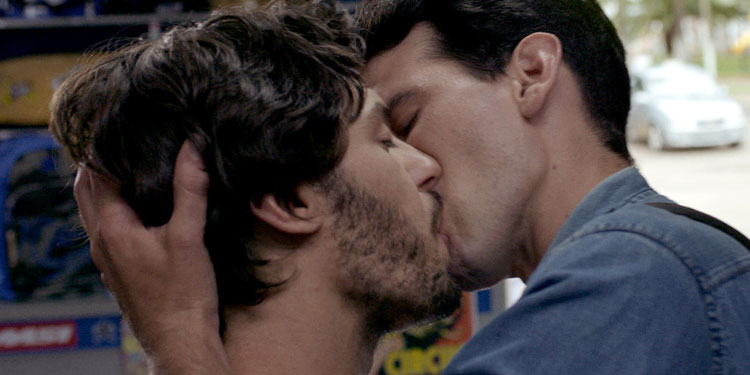
Director: Papu Curotto
Running Time: 83 mins
Certificate: 15
Release Date: July 10th 2017 (UK)

Esteros follows two men at two different points in their lives, interweaving what happened in their teenage years with their lives 10 years later. In their mid-teens, Jeronimo and Matias are friends who enjoy play during the long, hot summer days. However, on the cusp of manhood their relationship begins to move past just friendship as they realise their feelings for one and develop something deeper and more physical.
10 years late they are estranged, but one of them returns to their hometown for carnival, which causes them to reconnect. Jeronimo is now a proudly gay – but single – man. Matias meanwhile is engaged to a woman. Initially unsure how to communicate with one another, when they start revisiting the places and activities that brought them together as teens, they begin to reconnect. Matias in particular must decide whether what they once had was just a youthful fling, or something deeper.
There’s no doubt that a lot of gay movies have fairly similar plots and deal with similar issues. But seeing as most mainstream movies for the last 40 years have had only about six basic plots between them, if done well recycling familiar ideas isn’t the end of the world. It’s certainly true that plot-wise Esteros does feel like we’ve been here before, mixing the awakening sexuality of teenagers, with a story of a man with a fiancé who may be hiding his feelings for guys.
Even with those gay-film staple plots, Esteros doesn’t feel like it’s merely treading old ground. Indeed, by mixing those two stories together, it finds new things in them, questioning how budding sexuality might get curtailed, as well the reconnecting power of attraction that people can have after being separated for years.
The teen part of the tale is told in a very sweet way, showing Matias and Jero as people who are still boys, even if they are starting to become men. There’s a sweet innocence to the way their relationship moves from friendship to romance, initially allowed to emerge in a very natural way away from the sort of societal and familial pressures that might prevent it.
As adults things are more tense. Although it would have been easy to present Matias as a coward afraid of the fact he’s gay, Esteros is a little more complex than that. Indeed, unlike many other similar movies it doesn’t even suggest his feelings for his fiancé are fake – it’s just that perhaps Jeronimo is the one he truly wants.
Ignacio Rogers and Esteban Masturini are very good as the older Matias and Jero, bringing a real sense of sexual tension to the film. While Jero is more relaxed than the uncomfortable Matias, he still obviously has feelings for his former ‘boyfriend’, and both must negotiate whether it’s possible for them to be able to return to either friendship or something more.
As when they were teens, there is tension between who you can be while in society with other people and who you can be when it’s just two people away from the world, with only nature for company. It is ultimately whether they can overcome that – and whether their bond is strong enough for Matias to take a chance on his old love.
Overall Verdict: Esteros is a charming, romantic and sometimes sweetly sexy movie. It may initially look like it’s merely covering old ground, but it does it well while finding new things in its two-part plot.
Reviewer: Tim Isaac
Leave a Reply (if comment does not appear immediately, it may have been held for moderation)